danbricklin.com/log
|
||
|
|
Starting May 19, 2000
PCs vs. appliances, Thoughts about the "Love Bug", Where to go in Italy as an engineer, Digital camera lust
19-24May00
2000_05_19.htm
|
|
Wednesday, May 24, 2000
PCs vs. appliances
I attended another conference yesterday. (I'll write it up in a few days.) I was taking notes with my Palm PDA and keyboard as usual when I noticed a person in the row in front of me similarly typing, but with one of those neat, tiny, 2 pound, Sony Vaios with a 1024x480 pixel screen and built-in video camera (the C1XS model, I guess). So cool! Boy, I'd like one of those.
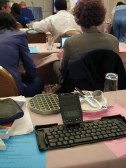 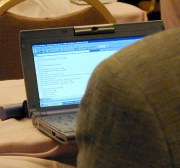 My setup vs. a very portable and capable laptop
I started thinking: You know, maybe this PDA and appliance business is silly. Here she has something just a little bigger and heavier, but it's a real PC. You can take notes on it just like I do. You can run lots of programs. Why pay for all these pieces of hardware for each application, each with its own microprocessor and memory, when all you need to do is add software to the laptop?
Then I got brought back to reality. Still in the morning session, her machine went off. She took out another battery and swapped it. She rebooted and waited for ScanDisk (I guess it didn't shut down cleanly).
 Changing the battery
I had changed the two AAA batteries in my Palm before I started taking notes at a conference last week. I took notes all morning yesterday. It still has over 90% power left.
Then I thought about all those applications. We're used to PC applications costing $99-$895 each. 1-2-3 was $495. Photoshop is about $600 (street price). Dreamweaver is $295 -- $120 just to "upgrade". Quicken 2000 is $69, Lotus Organizer is $75.
Thanks to Moore's Law and consumer-volume economics, "appliances" like a Palm III or Visor are $149-$249. It's only $99-$199 for "applications" executed in hardware like a folding keyboard, GPS, or a plug-in camera. Even a good digital camera is not much more than Photoshop. You barely think of the price of cellphone hardware. Replacing your old PDA with a new one costs about the same as a Microsoft Office "upgrade". I'm really using these things productively, as are other people I know -- this isn't futuristic anymore.
With the younger generations brought up on Walkmans, GameBoys, beepers, cellphones, and cargo pants, new applications are just as likely to be another thing to carry as a thing to download. Maybe Microsoft's hardware group will branch out of mice and keyboards and threaten the Office group...
Of course, there are some applications, like Trellix Web, Photoshop, programming, spreadsheets (
Friday, May 19, 2000
Thoughts about the "Love Bug"
I was struck by what I saw on the front page of the New York Times a few days ago. There, together beneath the fold, were two articles. On the left: About a man admitting he may have inadvertently released the "Love Bug". On the right: Investigation of inadvertent creation of a wildfire in New Mexico. Two man-made disasters by the simple acts of a few individuals. Both with costs over $1 billion. One in cyberspace and one in real space.
The world feels so different in cyberspace. A fire in New Mexico sounds horrible to us here in Massachusetts, but you don't worry much about it affecting your home. A computer virus in Hong Kong is as likely to affect you as a cold-sufferer sneezing in the row across from you in the bus.
When we celebrated New Years 2000 you could watch the world turn and each country celebrate it in its own, unique way. While we were all together sharing the event, we reveled in our diversity. Starting when the "Love Bug" first struck in Hong Kong, you could watch it follow the sunrise around the world, everybody being treated the same. Our diversity was measured in which software we were running and how susceptible it was to this particular virus, not by who our parents were or what job we had.
Just some thoughts I've been meaning to write.
Where to go in Italy as an engineer
David Winer wrote in Scripting News Wednesday that he may go to Italy in a few days (he's in Amsterdam at a conference right now). Never having been in Italy, he asked "Where should I go?" I've only been there once, but I have what I feel is a special suggestion. Since it will probably apply to many of the readers of this log who are also engineers and make tools for others, I'll post it here, too:
You asked where to go in Italy. Here's my two cents:
If you feel like an engineer and want to go to an awesome place (as in to be in awe of what you are seeing), if you get to Florence (a wonderful city that people told me was the place they'd go in Europe if they had only one place to go), visit the Institute and Museum of History of Science:
This is not a common place to visit in Florence, it seems, unless you know about it.
They have the actual lens that Galileo used to discover the moons of Jupiter, as well as the tools he used to make the lenses he used and setups for famous experiments we take for granted today. It even has, believe it or not, one of his fingers (removed from his body when it was moved to a more honored place from the original dishonored place). They have lots of other original instruments of the olden days. A short walk away is where Galileo, and many other very well known people who changed the world, are buried.
Florence is great, anyway, so it's worth visiting to see the David and lots of other wonderful art. This museum, though, just made a special impression on me as an engineer to see the tools the old engineers built and that people used. You felt in the presence of them through the work of their hands. Better yet, much of what is displayed is not only useful, but looks like works of art. (Our use of "skins" on software today pales in comparison to the detail work on some of the instruments.) It helps connect you to the past and feel our place in a long history as toolbuilders.
- Email from Dan Bricklin to Dave Winer
Digital camera lust
Some people walked into my office while I was writing the items above. Xenophon Beake, a photographer, is going to take pictures of senior executives here at Trellix for some new part of the Trellix web site and he wanted to meet his subjects in advance. I'm one of them. He brought his toy: a Nikon D1 digital camera. Instant techno-lust! What a wonderful camera. As part of his "getting to know me", he insisted that I fondle the camera, see how fast it focuses, and even take a shot or two. Bliss! As I took pictures to share the experience here on my log with my little "pro-sumer"-level camera it felt so puny and inadequate. Unlike cellphones, this is a high-tech area where smaller isn't always more desirable. (But then, my camera is small enough to take with me almost everywhere, so I'd never want to give it up. The D1 and lens is a hunk of a piece of equipment to carry casually.)
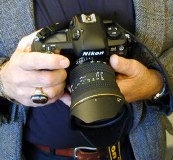 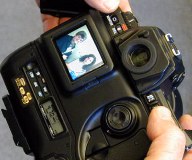 Nikon D1 in the hands of a professional
He made sure to show me that he had an IBM Microdrive. This is a CompactFlash 340MB hard disk drive (about 1/2 the size of a PCMCIA card). Holds a lot of pictures. Really cool!
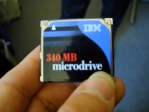 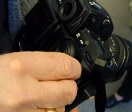 Storage for the digital pictures, inserting it into the camera
Just thought I'd share what I ran into. It's the first time I actually touched one of these, so my log lets me mark the occasion.
|
||
|
© Copyright 1999-2018 by Daniel Bricklin
All Rights Reserved.
|
||